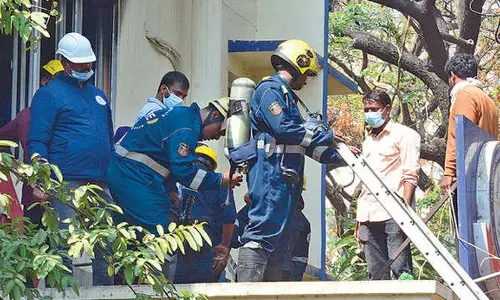Mixing Covid doses may help boost immune response: Study

Mixing Covid doses may help boost immune response: Study
Taking the first dose of Pfizer Covid vaccine and then AstraZeneca for the second can provide good protection against the pandemic virus, a study has found
Taking the first dose of Pfizer Covid vaccine and then AstraZeneca for the second can provide good protection against the pandemic virus, a study has found.
The Com-Cov trial, led by researchers from the University of Oxford, looked at the efficacy of either two doses of Pfizer, two of AstraZeneca, or one of them followed by the other. The results showed that all combinations worked well, priming the immune system, the BBC reported.
The study included 850 volunteers aged 50 and above, who were given the doses four weeks apart. The team found that people who took AstraZeneca shot followed by Pfizer showed higher antibodies and T cell responses than those who took Pfizer followed by AstraZeneca.
Both of these mixes induced higher antibodies than two doses of AstraZeneca, while the highest antibody response was seen after two doses of Pfizer, and the highest T cell response from AstraZeneca followed by Pfizer.
"We already know that both standard schedules are very effective against severe disease and hospitalisations, including against the Delta variant when given at eight to 12 weeks apart," lead investigator Professor Matthew Snape, from varsity was quoted as saying.
He however, added that the findings did not undermine the UK policy of giving people the same jab twice.
But, they do offer such flexibility for vaccine rollout in the future.
"Mixing doses could provide us with even greater flexibility for a booster programme, while also supporting countries who have further to go with their vaccine rollouts, and who may be experiencing supply difficulties," UK's deputy chief medical officer, Prof Jonathan Van-Tam, was quoted as saying by the BBC.
Two doses are important to give the fullest protection and teach the body to make antibodies and T cells to block and kill Covid.
Meanwhile, a pre-print study suggests that a third dose of AstraZeneca vaccine, given more than six months after the second, boosts the immune system, the BBC reported.
But, there is currently no data to support that a Covid-19 vaccine booster shot is needed for the general population, according to the US Centers for Disease Control and Prevention. An extra dose may be needed for more-vulnerable groups, such as older adults or organ transplant patients.















